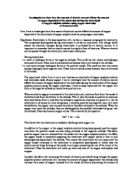Cu2+ + 2e- Cu
At anode the copper decompose forming copper ions:
Cu Cu2+ - 2e-
Therefore the result is that anode wears away while cathode gains mass
Plan: The apparatus I will use for the investigation is listed below:
∙D.C. power supply - for providing the power for the experiment.
∙Ammeter - for measuring the amount of current flowing though the circuit.
∙Electrodes [Anode (+) and Cathode (-)]
∙Circuit wire - for connecting up the apparatus to the power supply.
∙Beaker - for holding copper sulphate solution.
∙Copper sulphate solution - for doing the electrolysis experiment.
∙Wire wool - for cleaning the electrodes.
First I will start by cleaning each of the electrodes with wire wool then dipping each in water followed by ethanol and propanone. After allowing the electrodes to dry I will the weigh each one by one and record the weight. I will then set up all apparatus needed. I will start with the current at 2A and increase the voltage 2 amps at a time after each test until a voltage of 12A is reached. After each test I will dip the electrodes in water ethanol and propanone in order to clean off any access copper sulphate solution which may effect the overall mass of the electrodes. I will then weigh each of the electrodes and record the mass.
I will record all results in a table with the following headings:
∙ Voltage (in amps)
∙Start mass (in grams) – anode/cathode
∙End mass (in grams) – anode/cathode
∙Difference (in grams)
I will collect accurate results by repeating the experiment twice I will then take these results to work out an average result table.
I will make the experiment safe by making the following precautions:
∙ Electricity is dangerous therefore I will be careful while connecting the apparatus and always check that the power supply is turned off while connecting the apparatus.
∙ Too much electricity is also dangerous because it might cause the equipment to work over load causing it to break.
∙ I will also wear safety goggles this is due to the copper sulphate that I will be working with e.g. the solution could get vigorous and splash into my face.
Observing: I will now record my results in the table below:
I will now repeat the experiment to make sure that my results are correct:
I will now work out a table of averages for these results. For this I have added the results from table 1 to table 2 taken this figure and divided it by 2.overleaf are these results:
Analysis: from looking at the graph I plotted for the start mass of both the anode and cathode you can see that the mass of the Anode decreases and the mass of the Cathode increases. There appears to be one odd result on the Cathode from 2 amps to 4 amps as the increase here seems to be Large compared to the rest of the results. Also on the Anode there appears to be an odd results from 2 amps to 4 amps, as the decrease here seems to be smaller than the rest of the results. I have illustrated this with a line of best fit. The same pattern occurs in the graph I plotted for the end mass of both the Anode and Cathode (mass of anode decreases, mass of Cathode increases). There appears to be no odd results on both the anode and cathode. I have also illustrated this pattern with a line of best fit.
The patterns seen on both graphs are what I predicted. I predicted that as the current increases the mass gained on the anode will decrease and the mass gained on the Cathode would increase. I have explained in my prediction why these patterns took place.
Evaluation: My results did show patterns, that being that as the current increases the mass gained on the anode decreases and the mass gained on the Cathode increases. I was able to make accurate measurements and my results were reliable as I repeated the experiment twice and worked out an average of the results I gained.
Only two of my results did not fit a pattern I have stated this in the Analysis of the investigation. With there being only two odd results I had enough results to see a clear pattern. All the equipment worked properly in the experiment. Overall the investigation went well if I were to change any thing I would measure the concentration of the copper sulphate solution rather than the power of the current.







